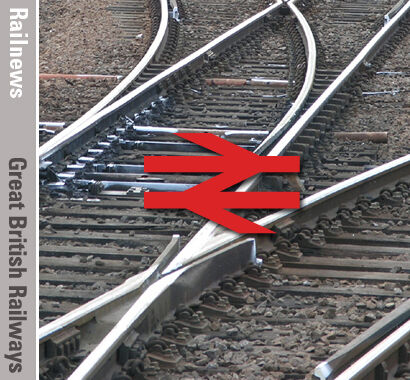The Labour Party has published its proposal for creating Great British Railways, which is called ‘Getting Britain moving’ and runs to 28 pages.
Speaking in London this morning, shadow transport secretary Louise Haigh said: ‘If I am secretary of state, I won’t be running the railways day-to-day, but I will act as ‘passenger-in-chief’ – setting the strategy and objectives for Great British Railways, and holding it to account.
‘But, unlike current Ministers, I will trust the experts. Experts who don’t just come from the rail sector – because we all know that it can sometimes be a little too inward-looking. But external experts in providing exceptional customer service.’
Instructions
She revealed that if Labour is elected, instructions will be given immediately to the Department for Transport, Network Rail, the Rail Delivery Group and the Operator of Last Resort ‘to work together from day one to create a “shadow” Great British Railways’.
She continued: ‘This will fire the starting gun on reform and make sure we don’t lose valuable time. Step Two will see us pass the primary legislation needed to formally establish Great British Railways as an arm’s length body, ensuring that it is structured around the needs of passengers and freight.
‘Every five years, the Secretary of State will issue a long-term strategy, which will set out how the railway should deliver against clear passenger objectives. And Great British Railways will be incentivised to grow the number of people using rail and the revenues from it. And importantly, it will provide the clarity and certainty of outlook the sector has been missing for so long.’
Open access passenger and freight
Labour says open access passenger and freight operators will not be nationalised. Labour’s document ‘Getting Britain Moving’ says: ‘The Secretary of State will impose a duty on Great British Railways to enable the growth of rail freight alongside passenger services, setting clear and meaningful targets for rail freight growth’.
Labour also wants third-party ticket retailers to continue, and held its event at the offices of Trainline.
RoSCOs
Rolling stock leasing companies will continue to exist.
Labour says: ‘We will develop a long-term industrial strategy for rolling stock which supports British manufacturing, innovation and interoperability and aligns with the wider objectives of the industry. This will seek to end the current boom-and-bust cycle, ensure a strong pipeline of work, and consider the best financing structures for future orders, in partnership with private capital.’
Stations
Great British Railways would take over the management of National Rail stations, and the creation of GBR as a ‘single directing mind and brand’.which is in contrast to Keith Williams’ description of Great British Railways in the 2021 Rail Review as a ‘guiding mind’.
Watchdog
Although answerable to the transport secretary, GBR would be held to account in the first instance by a ‘tough new passenger watchdog’, to be called the Passenger Standards Authority.
The PSA would absorb Transport Focus and the Rail Ombudsman, and also inherit some of the ORR’s functions – passenger assistance, passenger information, complaints and compensation codes of practice, monitoring and compliance, and consumer law, investigation and enforcement.
The future status of London TravelWatch is not mentioned, perhaps because it is sponsored and funded by the Greater London Authority.
ORR, HMRI, RSSB, RAIB, BTP
His Majesty’s Railway Inspectorate would continue as the safety regulator, and the ORR would also continue to decide such things as open access applications, although ‘on the basis of an updated framework and guidance’ from the transport secretary.
The status of the Rail Safety and Standards Board would be reviewed, ‘to ensure it is able to fulfil a similar role within the new model’.
Organisations which would keep their present functions and responsibilities include the Rail Accident Investigation Branch and British Transport Police.
Reactions
The plans have received a cool reaction from the Government.
Rail minister Huw Merriman said: ‘They don't have a plan to pay for the bill attached to their rail nationalisation. Without a plan to pay for this, it means one thing: taxes will rise on hard working people.’
However, Labour is claiming that re-uniting track and train, along with abolishing contracted passenger operators, could save more than £2 billion a year.
There has been a broad welcome for the proposals from many railway industry figures, including GB Railfreight chief executive officer John Smith, who said: ‘We welcome Labour’s plans to seize the huge economic potential of rail freight – an industry which already contributes £2.45 billion to the UK economy. We look forward to the opportunities Labour’s plans may present to our industry in the future.’
Paul Tuohy of the Campaign for Better Transport said: ‘We’re pleased to see that Labour’s plans for the railways aim to deliver much-needed reforms and promise to put passengers and freight first. Rail reform is long overdue, and passengers have waited long enough, so we particularly welcome the commitment to fares and ticketing reforms and to establishing Great British Railways.
‘We are also pleased that many of our own recommendations for improving the rail network – including a best price ticket guarantee, a commitment to move more freight by rail and nationwide digital season tickets – have been taken on board.
‘However, we are concerned that these plans may not strike the right balance between the government’s strategic direction for the railways and the benefits of private sector delivery. Our preferred model for the railways would be a franchising model, similar to Labour's plan for buses, with a role for open access operators.’


